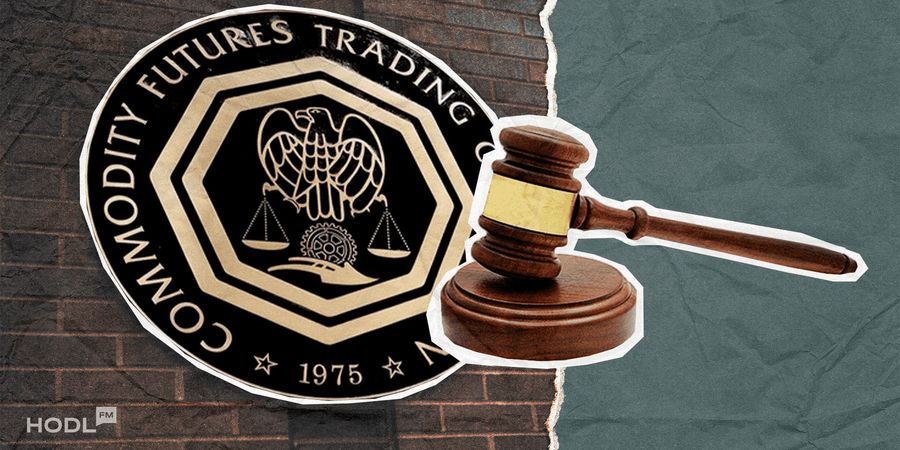The control of currency is perhaps among the most potent weapons any government anywhere wields and would never wish to yield. The determination by the DeFi market to disrupt existing systems, take away some of that power from governments, and give it back to individuals has never sat easily with governments as it portends titanic economic, cultural, and political clashes.
Read more: Ethereum’s Impending Doom? Liquid Staking Tokens to Conquer the Crypto World
This is the dilemma facing three decentralized finance (DeFi) companies Opyn, ZeroEx and Deridex accused by the U.S. Commodity Futures Trading Commission (CFTC) of financial impropriety in “unlawfully” offering cryptocurrency derivative trading.

Key allegations made by the CFTC
According to an order issued by the U.S. commodities regulator, the CFTC filed, settled charges, imposed hefty fines, and issued “cease and desist” orders against three decentralized exchanges (DEXs). The CFTC accused the three DeFi platforms, Opyn, ZeroEx (0x), and Deridex, of offering unlawful digital asset derivatives trading.
The CFTC’s issues are contained in a detailed report against the three DeFi protocols, stating they failed to obtain the requisite licenses to offer financial services in the United States. Deridex and Opyn also faced additional charges for not registering their designated contract market (DCM) and swap execution facility (SEF), besides not registering to operate as a futures commission merchant (FCM).
Moreover, the regulators held that the two DEXs were liable for violating the Bank Secrecy Act by enabling U.S-based users to violate anti-money laundering. The CFTC ordered Opyn, ZeroEx, and Deridex to pay civil monetary penalties of $ 250,000, $200,000, and $100,000, respectively.
Legal basis for the CFTC’s Jurisdiction over DeFi
Commenting on the CFTC against DeFi case, Ian McGinley, the agency’s director of enforcement, said there was no way DeFi operators could evade federal laws by merely using smart contracts. He emphasized that the CFTC was committed to ensuring digital asset derivative trading platforms involving U.S. residents were duly registered. The current enforcement order underlines the raging controversy within the DeFi community on including a regulatory approach in enforcing a balance between market integrity and emerging financial technologies.

The CFTC has a primary legal jurisdiction over derivative markets and a regulatory authority, including the commodities markets. However, there seems to be a lacuna regarding whether their prerogative should extend towards DeFi derivatives and crypto derivatives whose activities CFTC classifies as derivatives under its control.
In its introduction, the CFTC has classified Bitcoin and Ethereum as commodities, which categorization it uses to claim regulatory control over DeFi protocols created on blockchain networks. The watchdog has habitually extended the control toward networks offering futures contracts, derivatives trading, and other commodity-related financial products.
Response from Opyn, ZeroEx, and Deridex
In its report, the CFTC affirmed that all three companies, including ZeroEx, famous for its Ox protocol, never showed any hostility towards the investigative activities and consequently earned reduced penalties. While there hasn’t been any formal official response from representatives of ZeroEx and Opyn, accounts on Matcha, an app associated with Ox, seemed to continue unabated.
An official post on Ox’s Twitter handle stated they cooperated with CFTC, adding the inquiry involved less than 0.1% of their trading volume. The post reiterated the Matcha team’s desire to facilitate the adoption of Web 3.0 and that they welcomed CFTC’s involvement in their affairs. Per the statement, Ox involved external legal counsel in constructive dialogue with the CFTC.
Implications for DeFi in the United States
Members of the DeFi community are already raising concerns following the heightened regulatory efforts by CFTC, which they believe portends the potential to make DeFi illegal within the United States. While appreciating the necessity for implementing measures to promote market integrity and investor safety, there’s fear that excessively stringent restrictions could push innovators away besides restricting the growth of the nascent DeFi market.

Dissenting the enforcement vote, CFTC commissioner Summer Mersinger expressed his dissatisfaction, noting the regulator never gave evidence showing any misdemeanor that led to the loss of misappropriation of funds by the victimized DeFi protocols. Mersinger said his fear that the path taken by the Commission needed to be revised since a public engagement would have borne better results. There’s real apprehension within the DeFi space that the arbitrary application of federal laws could force DeFi operators and projects to exit the United States to avoid the ongoing regulatory uncertainties and kill creativity and the prospects associated with blockchain within the U.S.
Conclusion
The ongoing CFTC against DeFi legal battles could be a wake-up call to the DeFi community on the need for stakeholders to interact proactively with the authorities to negotiate the ever-changing regulatory landscape. By collaborating openly with the authorities charged with enforcing federal laws, the community could help regulators better understand the digital asset derivative trading in the complex DeFi sphere so they could propose a regulatory framework that could guarantee investor protection without stifling innovation.
This would augur well because if leading DeFi protocols could implement security and transparency procedures that foster regulatory compliance by introducing anti-money laundering (AML) and know-your-customer (KYC) procedures besides performing audits on smart contracts. Implementing such activities could demonstrate the DeFi community’s commitment to working with bodies like the CFTC to ensure a conducive investment environment.
The steady growth of the DeFi market indicates that decentralized finance has the wherewithal to enrich the financial ecosystem. DeFi has demonstrated its potential to cut transaction costs, enhance financial inclusion, and improve financial market transparency by introducing peer-to-peer transactions that eliminate the need for intermediaries.

While promoting these benefits that foster innovation and broader financial inclusion, regulators keen on creating DeFi regulation must consider these benefits to find the problematic but critical balance between oversight and innovation.
FAQs
How many DeFi protocols are there?
According to Consensys.net, there were at least 17,000 DeFi protocols and applications as of February 2022 at the height of the DeFi summer. The numbers could now be a little higher or lower, but there has been a positive, albeit slowed-down adoption rate, with DeFi wallets exceeding 4.4 million during the same period. However, you need to note that some users have multiple addresses or wallets, but this data shows that DeFi has a healthy disposition within the financial sector.
What are the main DeFi protocols?
According to DeFiLlama, the total value locked (TVL) in the DeFi market was at least $44.19 billion in July 2023. Following is a list of the leading DeFi protocols:
- Uniswap: The DEX enables users to trade on the ETH blockchain.
- MakerDAO: The platform issues stablecoins using collateralized debt positions.
- Compound: The DEX facilitates borrowing and lending where users earn interest on assets.
- Aave: The protocol allows users to borrow against their assets and earn interest.
- Kyber Network: A DEX that allows the instant conversion of crypto tokens
- Chainlink: The platform uses smart contracts to enable users’ access to chain data.
- Yearn.finance: A DeFi platform that combines borrowing, lending, and yield farming.
- Synthetix: A DEX where users can trade synthetic versions of conventional assets.
- dYdX: The DEX promotes derivatives and margin trading.
- Balancer: The exchange thrives in trading ERC-20 tokens.
What does the Commodity Futures Trading Commission do?
According to a U.S. Government website, the Commodity Futures Trading Commission is an agency whose primary role is regulating the United States’ derivative market, options, swaps, and futures. The mission of the CFTC is to enhance the integrity, vibrancy, and resilience of the derivative market via regulation.
More Info:
- Decentralized Finance (DeFi): Revolutionizing Traditional Financial Systems
- Centralized Exchanges: The DeFi Gateways We Never Knew We Needed
The Commission achieves its mission by policing the derivative market to prevent abuses. It works hard to promote customer protection besides reducing the risks associated with sutures and swaps markets to protect investors. CFTC also oversees swap execution facilities, designated contract markets, futures commission merchants, swap data repositories, and commodity pool operators, among other industry players.
Disclaimer: All materials on this site are for informational purposes only. None of the material should be interpreted as investment advice. Please note that despite the nature of much of the material created and hosted on this website, HODL FM is not a financial reference resource and the opinions of authors and other contributors are their own and should not be taken as financial advice. If you require advice of this sort, HODL FM strongly recommends contacting a qualified industry professional.




